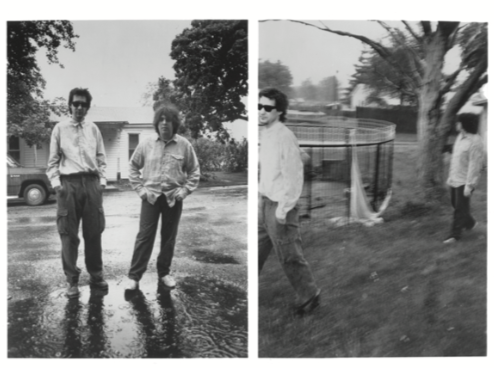Impetus
My CDs are kept on a shelf. When I think, “I would like to listen to some music,” I go to that shelf and examine them, consider them. I look at the spines and think, “I could listen to that… or that. That’s pretty good… I haven’t listened to that in awhile.” I think lots of things. My last thought, however, is invariably the same: “Yes, but why would I listen to that when I could listen to Souled American?” And then I do. I walk across my apartment—which is to say, I take approximately four steps—and consider a refined selection: Fe, Flubber, Around the Horn, Sonny, Frozen, and Notes Campfire.
These albums are kept isolated from all the rest, in a neat, brief row above my stereo. I stand before them and thus begins a new selection process. Using an approximate calculus that accounts for current mood and desired mood,
I pick an album. Whatever I decide, I decide this: to listen to Souled American. Since last August—when my friend Jeremy graciously bought me used copies of the first four—I have listened almost exclusively to these six albums. I do not mean that I have listened to them often or a lot. I mean this: when I listen to music, I listen to Souled American. I mean that I spend multiple hours per day listening, over and over again, to these albums.
And the thing is, I’m not even sure that I like them.
Expert
The music Souled American plays is not particularly pleasurable. As John Darnielle of the Mountain Goats wrote about first hearing the first song from their second album, “It was kind of annoying, but it was also hypnotic.” The music certainly isn’t uplifting. There is, again in Darnielle’s words, “an almost cosmic sadness to it.” The music isn’t technically impressive. Darnielle calls it “all huge droning suspended upright bass notes and keening monosyllables, decorated by heavily reverbed twanging guitars.” The music will not make you dance or sing along or do some stupid air-guitar thing. It fulfills music’s simplest function: it makes you listen—compulsively and tirelessly, spellbound and uncertain.
Evidentiary
The history of Souled American is one of loss, of disappearance. Originally, when they formed in 1986, Souled American had four members. Chris Grigoroff sang and played guitar. Joe Adducci played bass and sang. They both wrote songs. Scott Tuma, he played guitar, too, but quit in 1996, just before their most recent album came out. Jamey Barnard played the drums, if sparingly, but he left the band...
You have reached your article limit
Sign up for a digital subscription and continue reading all new issues, plus our entire archives, for just $1.50/month.
Already a subscriber? Sign in





